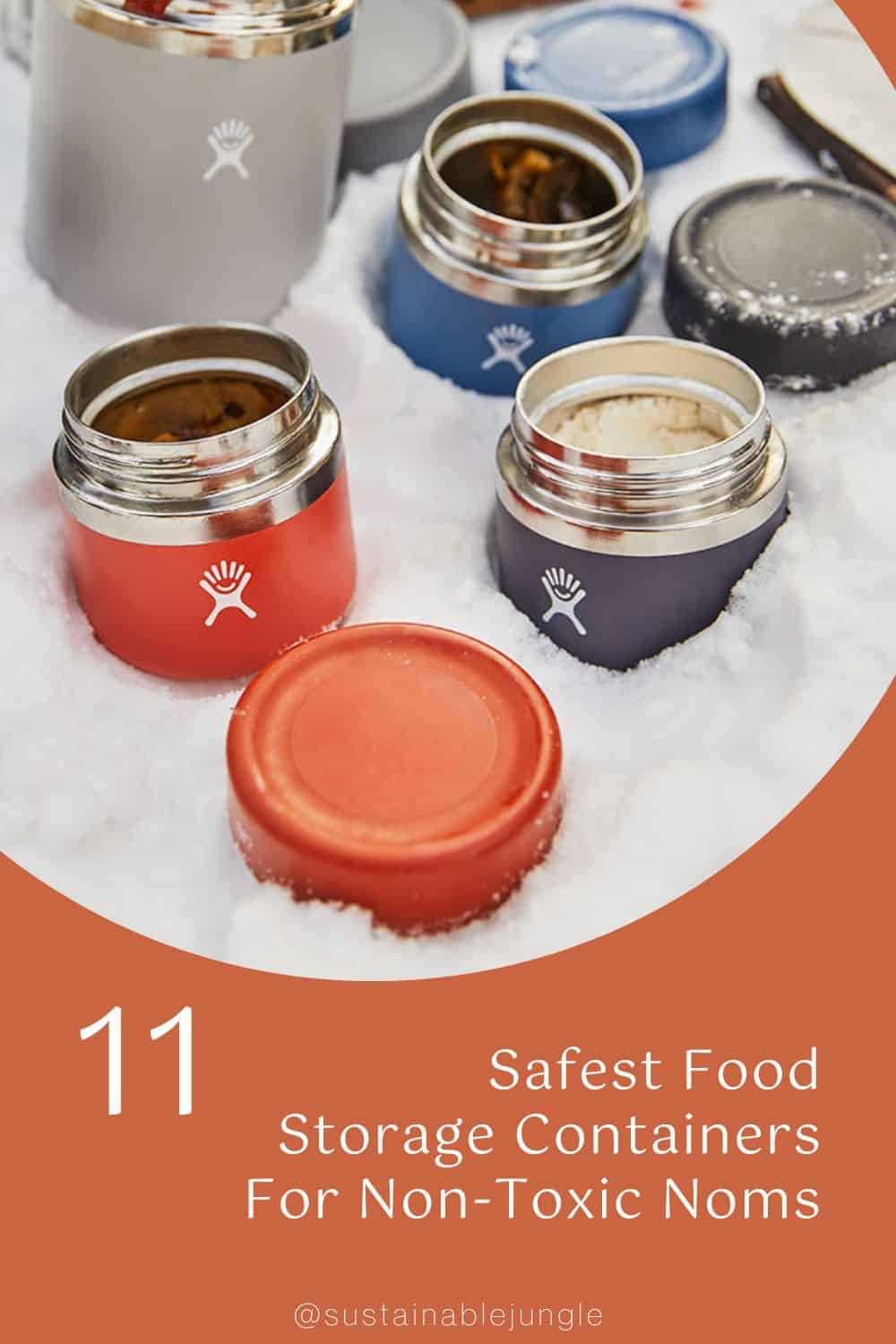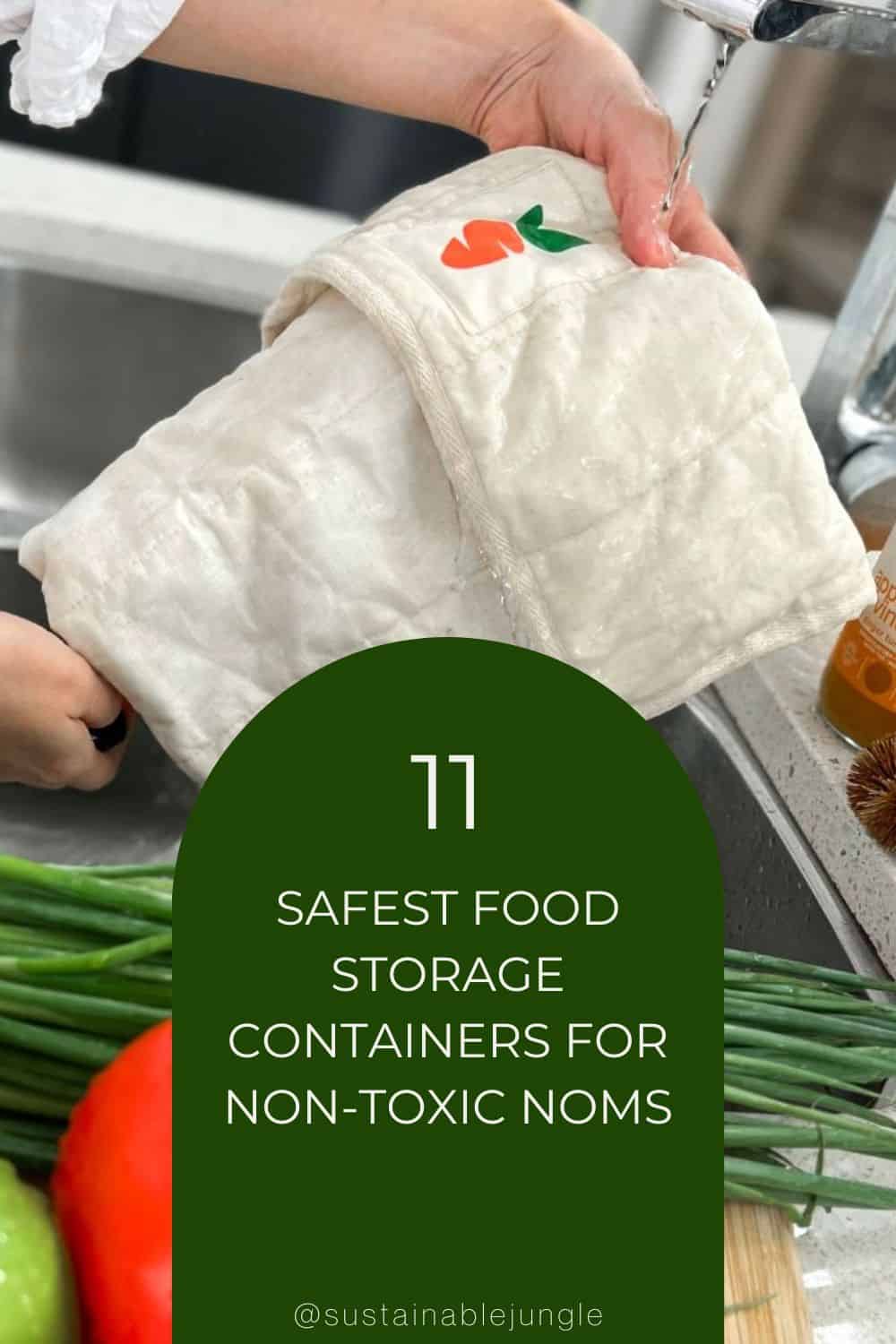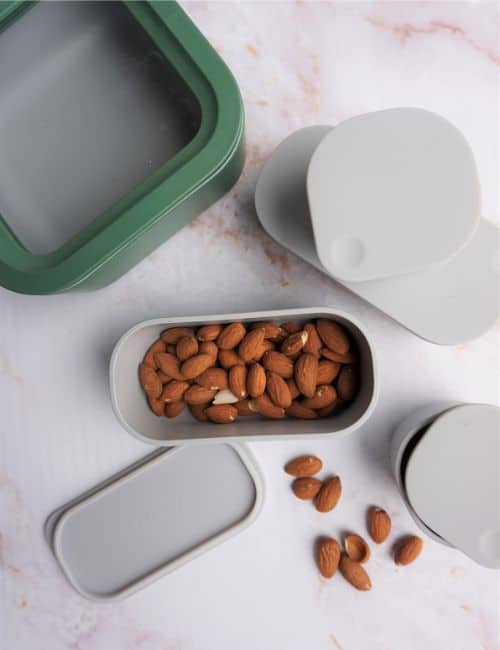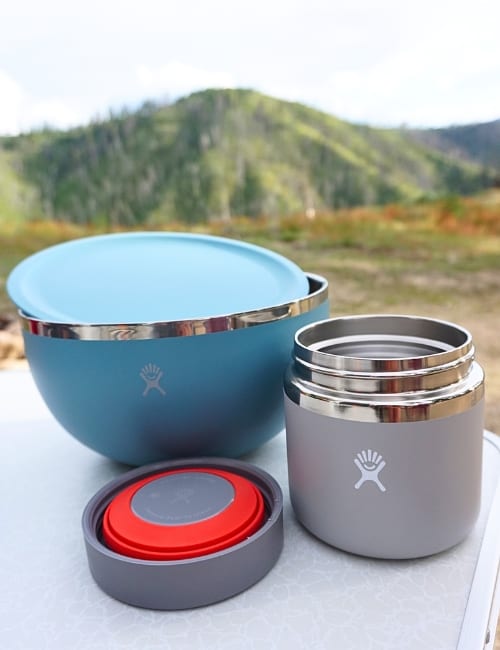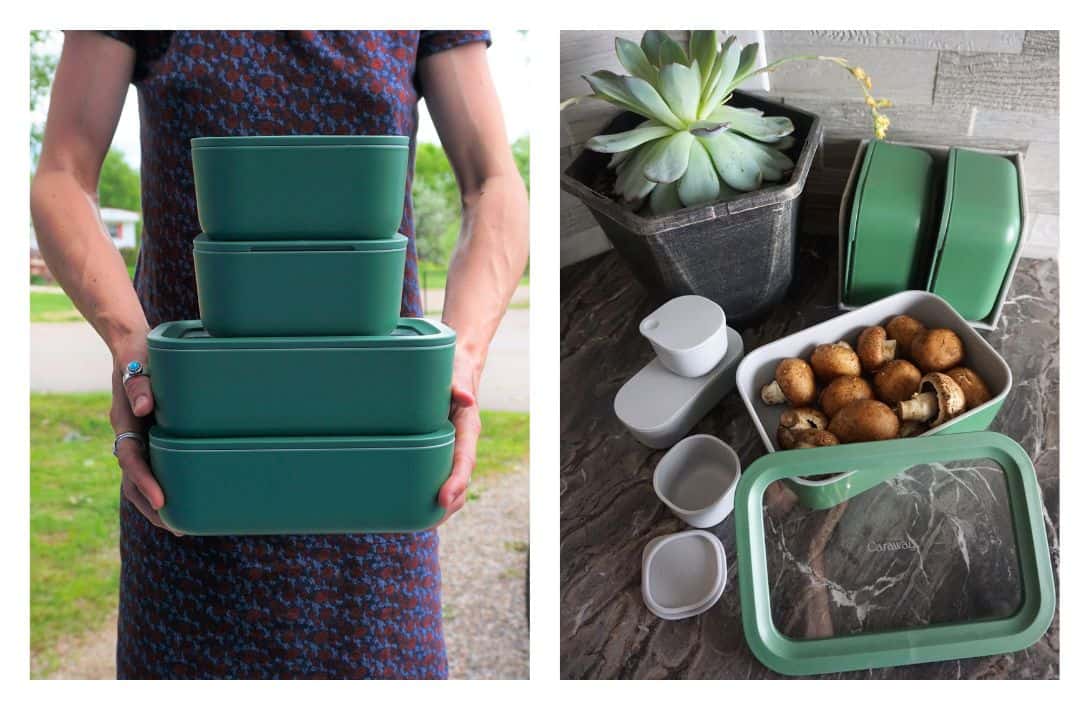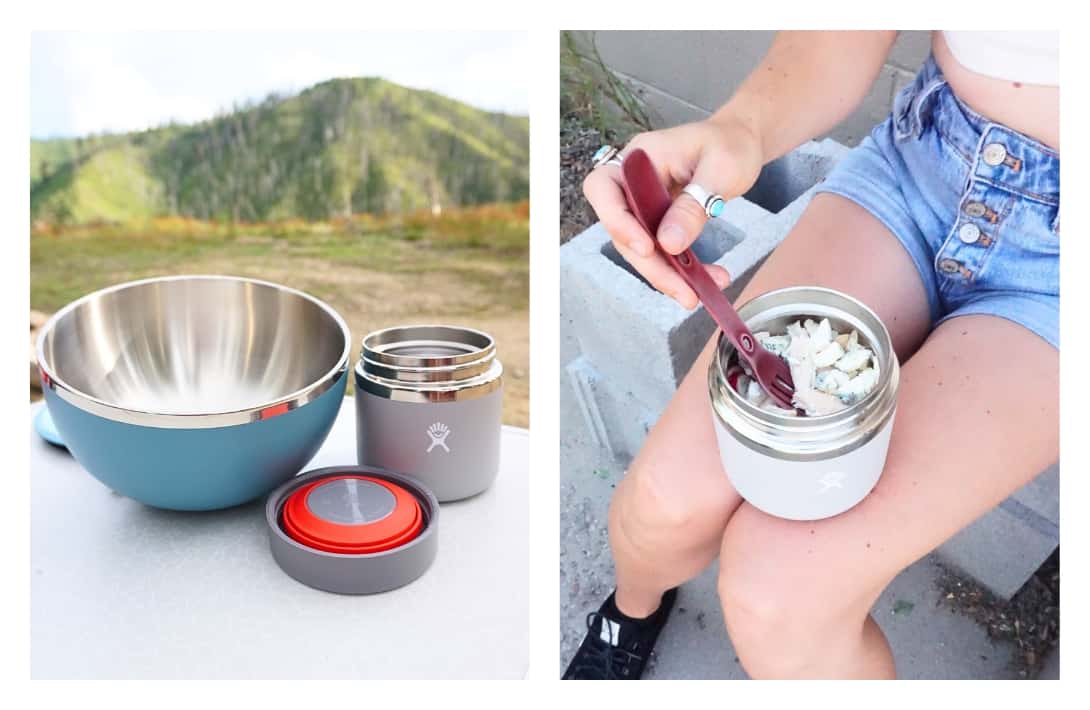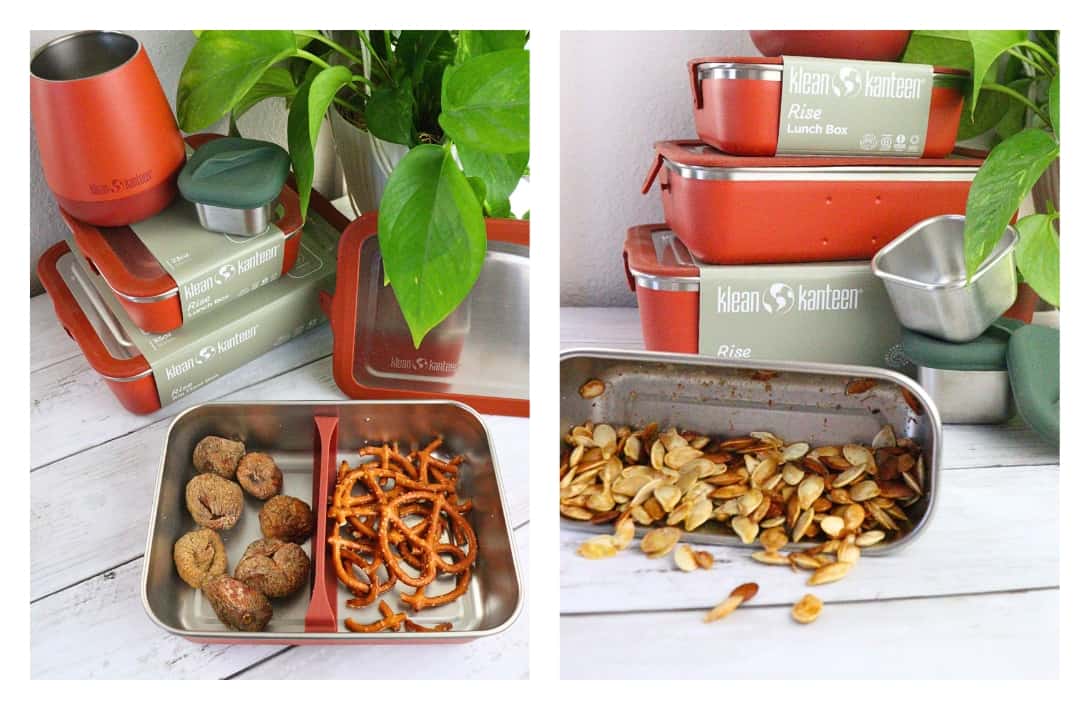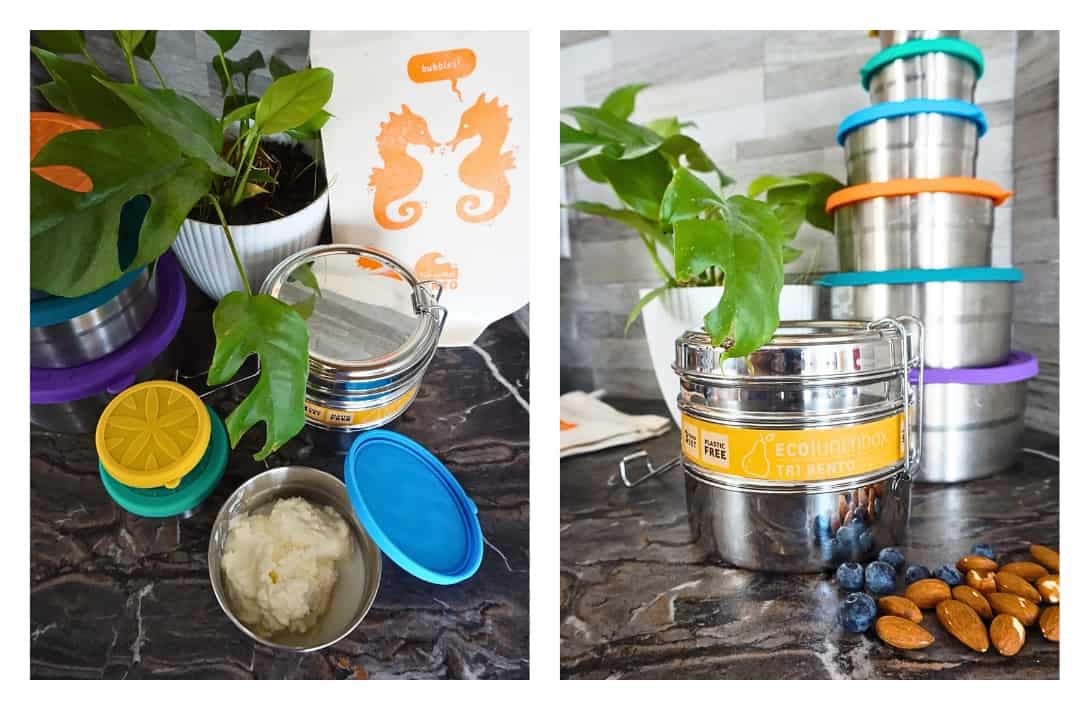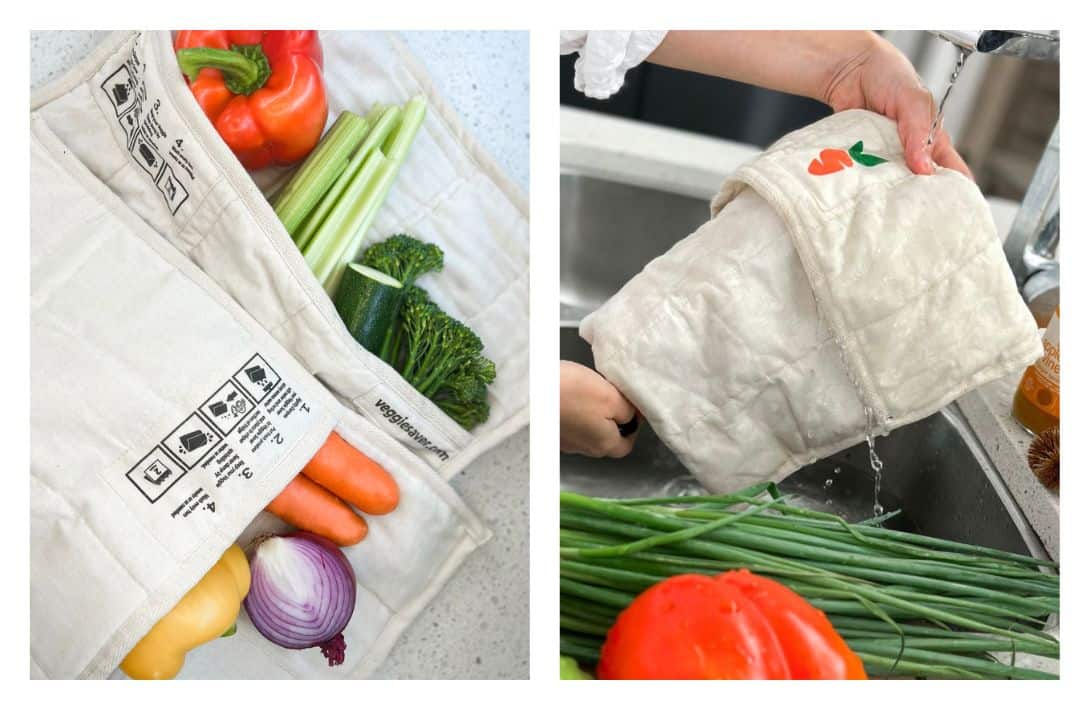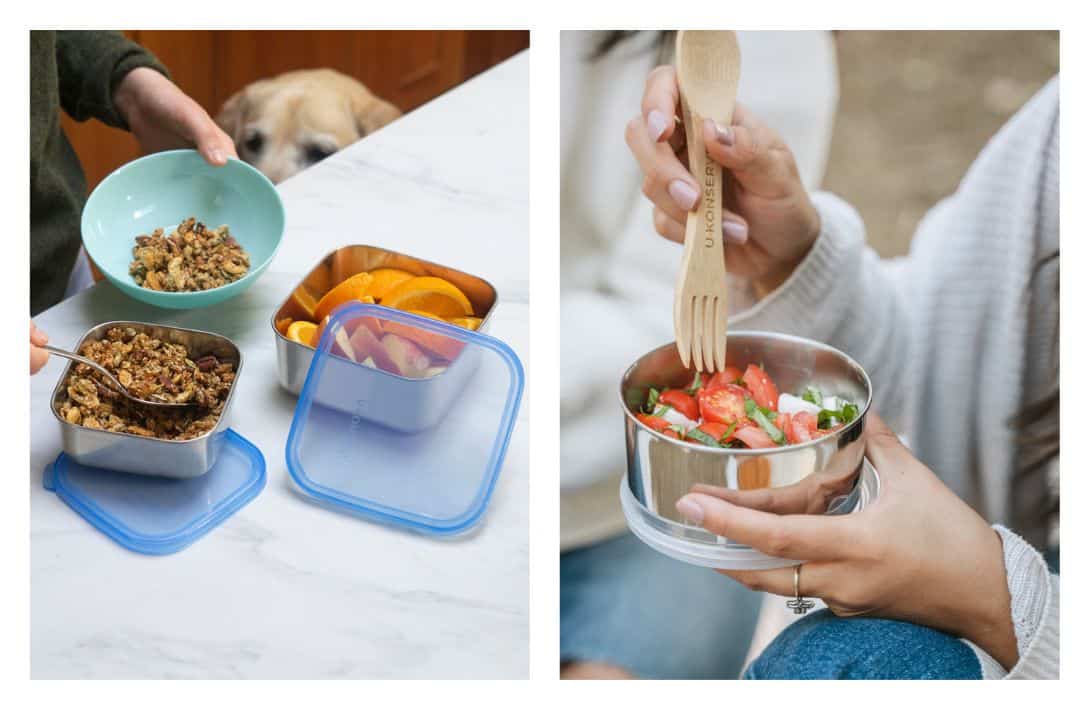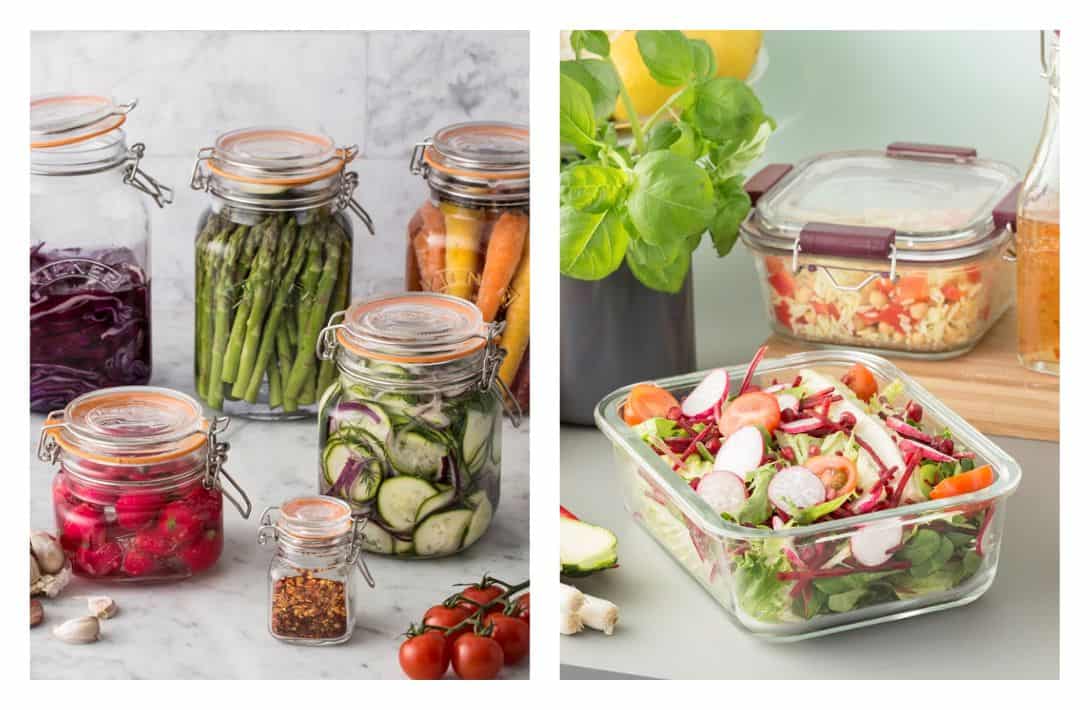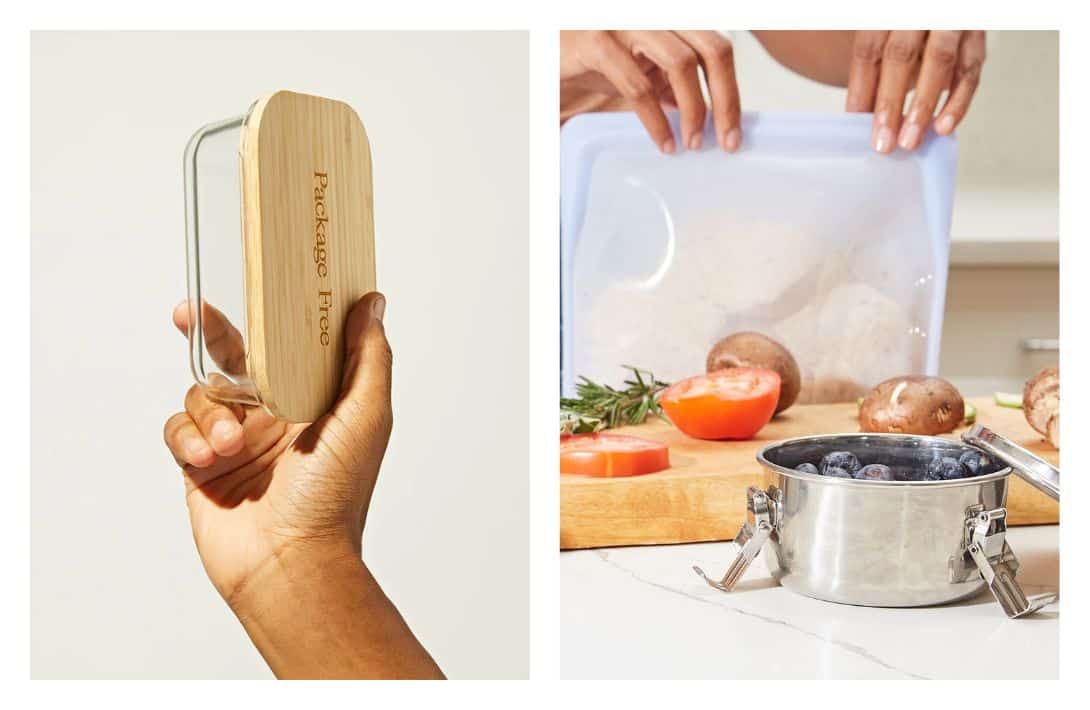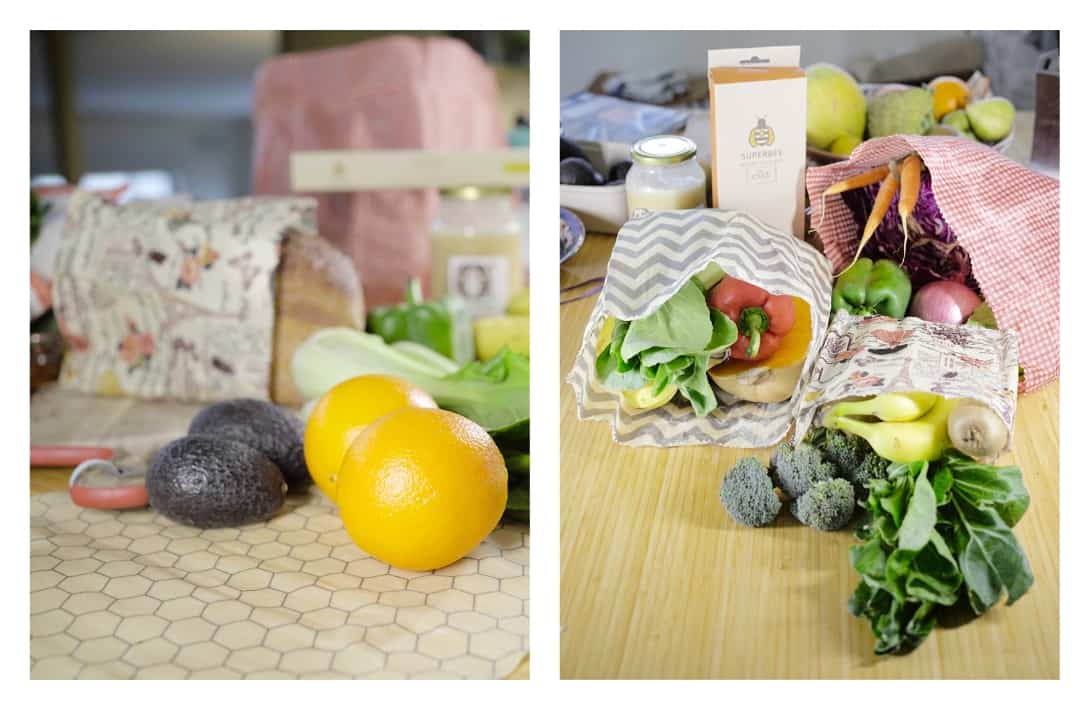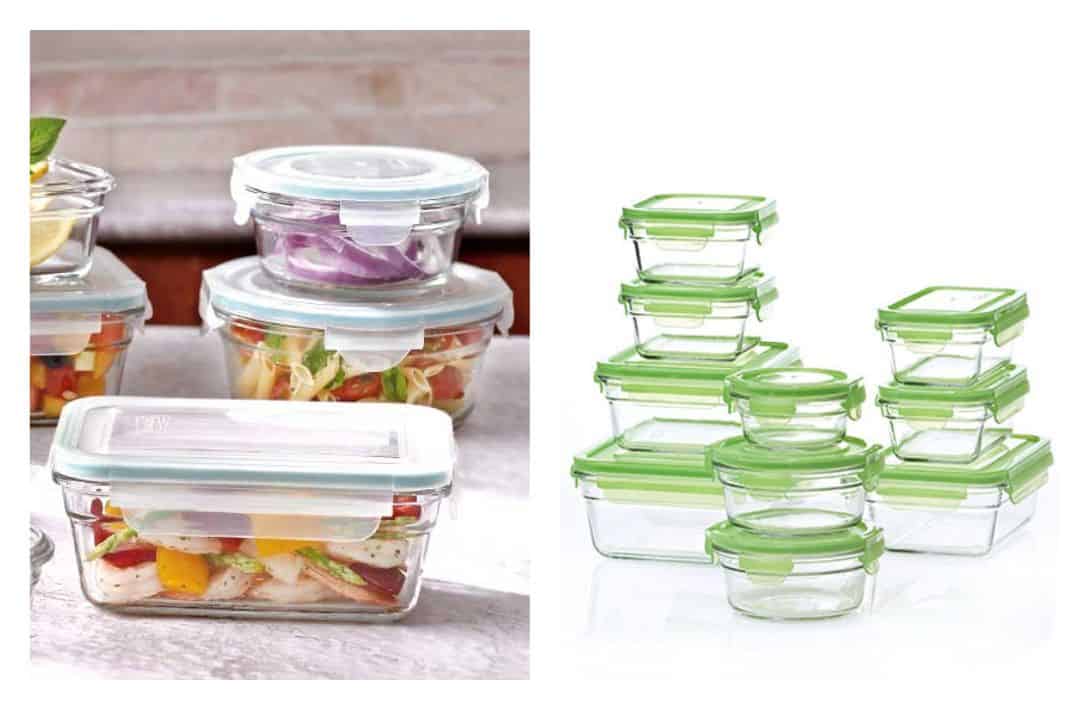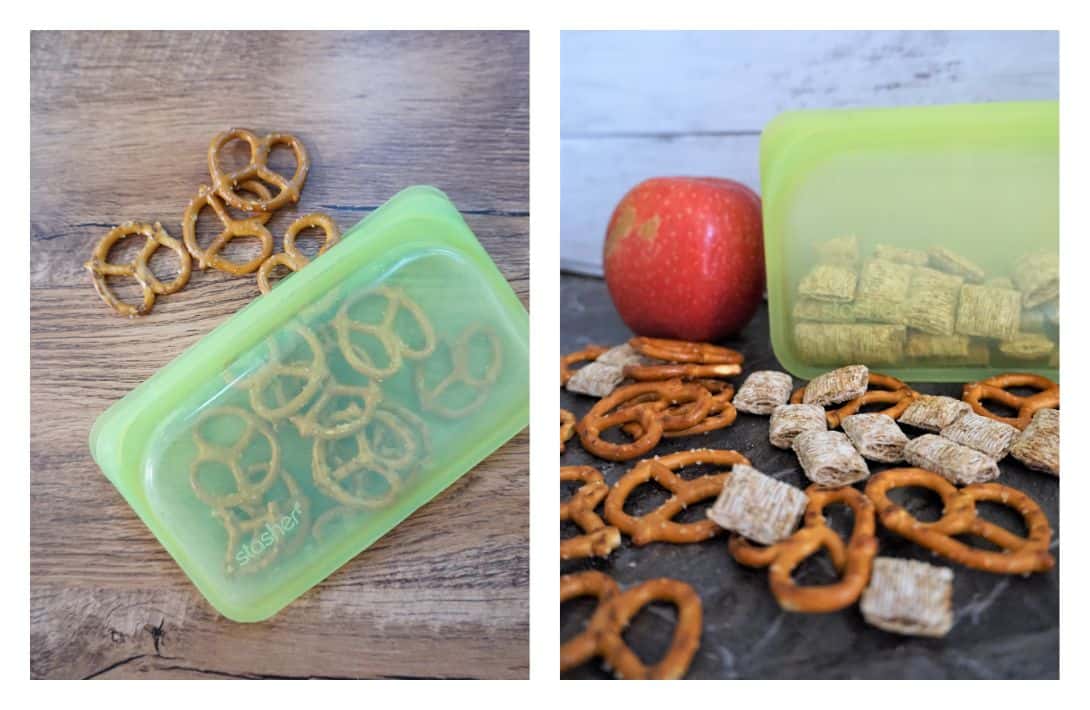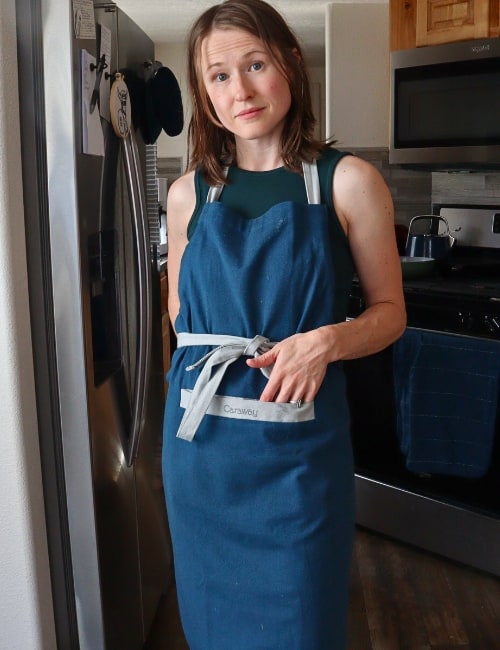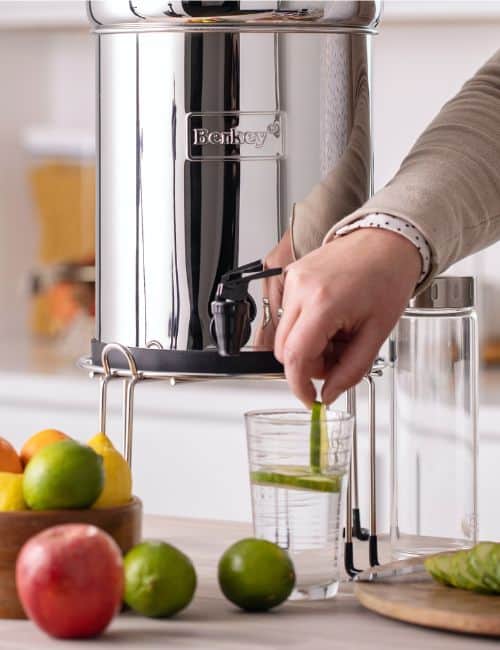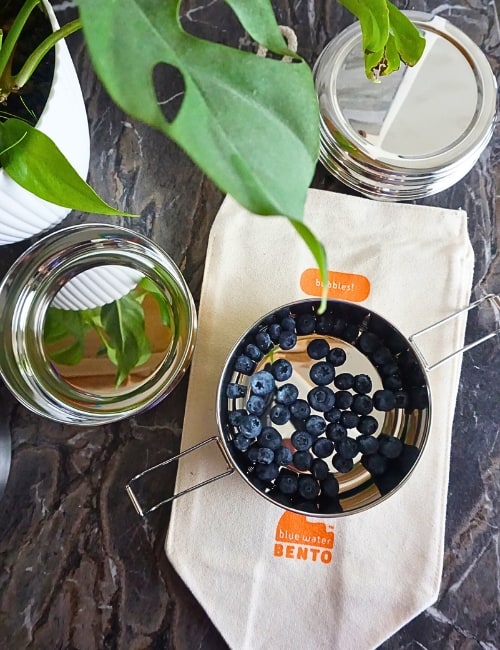11 Safest Food Storage Containers For Non-Toxic Noms
Have you heard the news?
Plastic is out, and safe is in—as in the safest food storage containers, that is.
Lately, we’ve seen a big movement toward more sustainable food brands—which is fantastic!—but we shouldn’t lose sight of what our food is stored in either.
Traditional plastic food containers are chock-full of harmful chemicals like BPA, BPS, phthalates, the list goes on. These substances can harm your health and often end up in landfills and oceans for years and years.
So which food containers are not harmful to people’s health and that of our world?
Well, the best non-toxic food storage containers use non-petroleum materials that are either recyclable or compostable and help you avoid any toxic substances from leaching into chicken and broccoli meal prep.
Everything we recommend to you on Sustainable Jungle is independently researched and we ask all brands to confirm their claims. To avoid waste, we test products on an as needed basis. This post contains affiliate links. If you buy something through our links, we may earn a small commission. Learn more about why we do this here.
The Best Non-Toxic Tupperware Brands For Safer Snacking
Caraway doesn’t skip on quality with its ceramic-coated, non-toxic glass tupperware sets that don’t contain any harmful chemicals.
If plastic-free, durable, and recycling are your jam, Package Free Shop’s airtight stainless steel food containers are your cabinet go-to.
Kilner Jars have stood the test of time with their ultra-durable glass mason jars that won’t crack in the dishwasher, microwave, or oven.
Don’t know if your Tupperware is toxic or take-out friendly?
Head over to the bottom of the article to see how we found the beyond BPA-free food storage containers and what materials to look for. Or watch our video above.
The Safest Non-Toxic Food Storage Containers
- Caraway | Visit Store
- Hydro Flask | Visit Store
- Klean Kanteen | Visit Store
- ECOlunchbox | Visit Store
- Veggie Saver Bag | Visit Store
- U Konserve | Visit Store
- Kilner Jars | Visit Store
- Package Free Shop | Visit Store
- SuperBee | Visit Store
- Glasslock | Visit Store
- Stasher | Visit Store
1. Caraway
Caraway’s Glass Storage Containers For Food
When it comes to cooking, Caraway is the master chef in our sustainable kitchen.
Their take on safe food storage containers are high-quality glass coated with non-stick ceramic. The lids feature Air Release Technology, ensuring your food is fresh and odorless.
The glass storage containers are available in small, medium, and large sizes, or in a set of all of them, which also comes with minimalist fabric covered storage slots to keep your cabinets tidy.
Caraway also offers Dot and Dash containers, which are fantastic for dipping sauces or sustainable snacks.
We’ve tested Caraway containers, and we can say they are some of the best non-toxic food storage containers available.
Not only are they safely stackable thanks to the slightly nested lids (which keep our fridge neat), but the non-stick coating really works. No more scrubbing out last week’s crusted on leftovers that we forgot about and let sit too long…
The set also comes with a magic cleaning eraser to remove tough stains, and we’re thrilled that it works just as well on their non-toxic bakeware and eco-friendly cookware.
However, because the ceramic coating can be scratched, we’re careful to use wood or silicone utensils when scooping from the containers to ensure the coating stays pristine for years.
We’ve also tested them in the freezer, dishwasher, and microwave, and we’re happy to announce they perform well in each, but we do follow Caraway’s advice to keep the Dot and Dash containers out of the microwave.
We personally like to keep things green in every sense—hence why all our Caraway goodies come in the lovely muted Sage color—but you can choose from a range of soft, minimalist colors to better suit your personal palette (color, not taste, that is!).
About Caraway
Caraway products on the whole don’t contain any BPA, BPS, PFOA, PTFE, or heavy metals. It’s dishwasher safe and includes a non-toxic, non-stick ceramic coating for easy cleanup.
It’s also associated with 60% less CO2 than other non-stick coatings.
All Caraway products are shipped without single-use plastics in packaging made from recycled cardboard and biodegradable cork trivets.
Caraway works with BSCI and SMETA production partners in China, ensuring employees are safe, respected, and paid fairly with benefits.
2. Hydro Flask
Hydro Flask’s Non-Toxic Metal Food Storage Containers
Nearly everyone’s familiar with the Hydro Flask name for their colorful range of insulated eco-friendly water bottles, but what about their BPA-free food storage containers?
The stainless steel containers are made from 18/8 pro-grade material for durability and zero flavor transfer.
They’re available in 8, 12, 20, and 28 oz sizes with a powder-coat finish that comes in just as many colors as their beloved bottles.
The food containers are dishwasher safe and have a leak proof seal, so you can take them on your next eco camping trip. But avoid any rogue appliances you find outdoors, as they aren’t oven, microwave, or freezer safe.
About Hydro Flask
The Hydro Flask headquarters is located in Bend, Oregon, but although there aren’t many details online, most of their eco-friendly camping gear and food storage products are made in a third-party audited factory in China.
The non-toxic food storage containers are shipped in FSC-certified paper packaging and come with a lifetime warranty against product defects.
One way Hydro Flask gives back is through Parks For All, a program they created to develop more green spaces and make the outdoors more accessible.
3. Klean Kanteen
Klean Kanteen’s Safest Food Storage Containers For Kids & Adults
Insulated water bottles, tumblers, lunchboxes, and food containers—Klean Kanteen has some of the best non-toxic food storage containers available.
The stainless steel containers, like the 20 Oz Food Box, are completely plastic-free. The leak proof silicone lids are perfect for travel, whether it’s to the office or classroom.
And if you need something a bit more heavy-duty for storing those organic snacks, the insulated containers will help you say goodbye to plastic storage containers for food, thanks to a sleek design, vacuum tight seal, and double-wall insulated design.
We’ve tried both, a la the Good To Go Kit, and love them each for different reasons.
The Food Box is perfect for storing leftovers in the fridge and for our everyday lunch items. For example, it perfectly fits a sandwich (even the big bread kind!) with a little extra room for some carrot or celery sticks on the site.
Because it’s so lightweight, it’s ideal as a packable container, and we like to keep it on hand if we go out to eat to sustainably box up any leftovers.
The insulated TKCanister is better used when we want a hot lunch, but don’t have the ability to heat it ourselves. That’s because it keeps hot food hot almost all day. We find the 32oz size to hold the perfect amount for two, making it the perfect picnic pal.
About Klean Kanteen
As a family and employee-owned Certified B Corp, Klean Kanteen prioritizes the well-being of its team and the environment over unethical production practices.
Nearly 95% of Klean Kanteen’s plastic-free water bottles and food containers use post-consumer recycled steel, cutting their greenhouse gas emission from steel nearly in half.
Products are also free of plastic, epoxy linings, BPA, and other toxic chemicals on their restricted substances list.
Klean Kanteen is also Climate Neutral Certified and a member of 1% for the Planet.
4. ECOlunchbox
ECOlunchbox’s Non-Toxic Tupperware
ECOlunchbox makes some of the safest storage containers for food in various shapes, sizes, and styles.
The food storage units are crafted from 100% high-quality, food-grade stainless steel. ECOlunchbox doesn’t use any BPAs, BPS, or phthalates when developing their non-toxic tupperware, either.
The Seal Cups are perfect meal prep containers, as they’re stackable and available in six sizes. The lids are made from food-safe silicone, and the containers are also microwave and dishwasher safe.
If you like to buy foods in bulk (as we encourage you to do!), many of the non-toxic food storage units have the tare weight etched on the bottom for a hassle-free checkout.
About ECOlunchbox
The female-owned Certified B Corp ships all of their non-toxic food storage in recyclable materials—which can be carbon-neutral through UPS.
ECOlunchbox also offsets the CO2 equivalent to 4.7 million pounds of coal burned every year.
5. Veggie Saver Bag
Veggie Saver Bag’s Food Grade Storage Containers
If you’re looking for safe food containers for produce, look no further than Veggie Saver Bag.
Made of 100% unbleached cotton, they’re designed to keep your fruits and vegetables crisp for at least two weeks.
The reusable food storage bags are machine washable and 100% compostable, helping you say goodbye to traditional plastic storage containers and bags.
They’re also non-toxic, non-allergenic, plastic-free, and food safe.
About Veggie Saver Bag
The Australian-owned company develops its food storage bags from natural materials, like unbleached, unseeded cotton.
They’re manufactured in India by a women-owned, SEDEX-certified facility, ensuring fair working conditions and wages for all employees.
Veggie Saver also donates 5% of every sale to Destiny Rescue, a non-profit fighting for the rescue and rehabilitation of child trafficking.
6. U Konserve
U Konserve’s Non-Toxic Food Storage Containers
Plastic-free food storage containers don’t need to be colorful to be safe and effective. Sometimes, simple, unpainted stainless steel will do.
When it comes to stainless steel food storage safety, U Konserve will help you conserve your food in the best way possible, helping thousands of people say goodbye to plastic food containers with their premium stainless steel and silicone containers.
The non-toxic tupperware is tested by CPSIA-accredited labs for any lead, BPAs, phthalates, and other harmful chemicals.
The different sizes, shapes, and freezer-safe design make it easy to store leftovers.
If you’re looking for silicone food storage, the BounceBox is as close to perfect as it gets. It’s dishwasher, microwave, freezer, and oven safe up to 400°F.
About U Konserve
U Konserve is family-owned and operated, making it easy to prioritize ethical production practices.
The products are crafted in Boulder, Colorado, and manufactured across facilities in China.
As a member of 1% for the Planet and fair trade supporter, U Konserve ensures fair working conditions and gives back to non-profit organizations.
7. Kilner Jars
Kilner Jars’ Healthy Food Storage Containers
Kilner Jars offers some of the safest glass food storage containers on the market.
The glass jars are made from durable, heat-resistant borosilicate glass, which is exceptionally durable and is less likely to crack, allowing you to put the glass jars in the microwave and oven.
Whether you need a stout glass jar for jam or something longer for canning, the glass containers don’t stain or leech flavor.
Acidic foods are also fine, as the glass containers are resistant to acid degradation.
The Breakfast Set is perfect for overnight oats, yogurt, storing granola, or anything else you would use glass storage containers for.
About Kilner Jars
Kilner Jars was established by John Kilner in 1842 in England.
Built on a foundation of food waste reduction, they share tips and recipes for how to preserve food at home, as well as ideas for upcycling Kilner jars for various purposes.
Whether upcycling or not, the brand encourages customers to recycle their glass jars and bottles properly once they are no longer needed.
Additionally, Kilner ensures that its manufacturing processes adhere to responsible waste management practices.
8. Package Free Shop
Package Free Shop’s Non-Toxic Metal Food Storage Containers
Package Free Shop hits nearly every mark with premium 18-10 food grade 316 stainless steel. It’s fire, oven, and dishwasher safe, but it can’t go in the microwave.
The plastic-free lids are airtight with a silicone seal installed without adhesive. Once the BPA-free containers reach the end of their lifespan, the base and seal can be recycled at accepted locations.
Package Free also carries borosilicate glass containers with tastefully designed sustainable bamboo lids.
About Package Free Shop
Can you guess where Package Free gets its name?
Every non-toxic food storage container is delivered in 100% plastic-free post-consumer cardboard. Everything is recyclable and compostable, including paper wrapping, labels, and tape.
The zero waste online store is also big on giving back, supporting countless organizations, including Los Sures Food Pantry, Habitat for Humanity, Surfrider, and Black Girls CODE, to name a few.
9. SuperBee
SuperBee’s Safe Food Storage Solutions
Sometimes, safe food storage containers don’t need to be containers at all.
In SuperBee’s case, they take the form of wraps, sandwich bags, and bread bags all made from (you guessed it) beeswax.
Responsibly harvested, pesticide-free beeswax, to bee precise.
The reusable food wraps start with a 100% GOTS-certified organic cotton base, coated with beeswax, tree resin, and organic coconut oil.
We’re buzzing about these beeswax wraps after having tried them ourselves, and we’re particularly impressed with how well they seal and keep food fresh.
Even things like bread, which we’ve found can go stale because of small air gaps in a beeswax wrap’s seal, stay soft and fresh in these.
If you’re new to beeswax wraps, you can start with the Beginner 3-wrap set. Or if you’re like us and are dedicated users, go for the full Beeswax Wrap Combo pack with bags and wraps of all sizes.
About SuperBee
SuperBee is a Certified B Corp, woman-owned, and supports women in Thailand by paying 20% more than the recommended living wage provided by the Fair Trade Association.
10. Glasslock
Glasslock’s Non-Toxic Glass Tupperware Sets
Glasslock’s catalog of non-toxic glass food storage containers is ultra-durable, thanks to the tempered glass that’s five times stronger than traditional glass containers.
The storage containers are BPA-free, non-toxic, freezer-safe, microwave-safe, and dishwasher-safe (on the top rack). They can go in the oven; just be mindful of the temperature.
The glass container lids include an airtight silicone seal and are available in circular and rectangular designs.
About Glasslock
By providing durable glass containers, Glasslock helps to minimize the use of disposable plastic containers and reduce plastic waste.
Because they’re so versatile, Glasslock provides safe containers for everything from lunches to baking.
Each of the non-toxic food containers is FDA-approved and safe to use in the service industry.
11. Stasher
Stasher’s Safe Food Storage Container Bags
If you’re looking for non-toxic food storage containers, freezer-friendly Stasher has the stash just for you.
These alternatives to Ziploc bags are made of 100% pure platinum-grade silicone, which is better than food-grade silicone alternatives
That means the silicone bags don’t contain any BPS, BPA, lead, phthalates, or latex.
We’ve been using Stasher bags for years—and in fact, we’re still using our original bags, which tells you how long these last.
Unlike other silicone bags we’ve tried that lose shape and discolor over time, Stasher bags stay their same colorful selves after years of regular use and cleaning.
Silicone is particularly easy to clean, either by hand or in the dishwasher. Just be sure to properly allow the inside to dry to prevent mildew that might leap onto unsuspecting food.
About Stasher
The downside is that silicone isn’t biodegradable and while it is recyclable, there aren’t yet widespread options to do so.
Stasher offers one of the few, thanks to a partnership with TerraCycle so customers can recycle damaged or old bags.
The company also utilizes SA8000-certified manufacturing sites and donates 1% to non-profit organizations supporting environmental causes across the globe.
Did you know we Have a Newsletter?
We cover the latest in sustainable living, fashion, zero waste, beauty, travel, finance and more…
Why Choose The Safest Food Storage Containers?
You may wonder, “Is it really necessary to switch out my old Tupperware?”.
Besides getting rid of unsightly pasta sauce stains, switching something more sustainable may benefit more than your cupboard aesthetics.
Let’s talk about why you shouldn’t store food in plastic containers.
Hard plastic containers typically contain Bisphenols (like BPA and BPS), while Ziploc bags and softer plastics typically contain phthalates.
These toxic chemicals can leach into stored food, making it into the body where they can cause numerous health problems.
BPA is linked to type 1 diabetes, high blood pressure, heart problems, and developmental problems—which is why the safest baby food containers should never be plastic.
Phthalates are known as endocrine disruptors, meaning they can interfere with normal hormonal function and lead to various health complications, like infertility and cancer. They also lead to high levels of oxidative stress, which is linked to cancer.
The body is sensitive to these chemicals, and small amounts can have a major impact.
When you store pasta sauce or other leftovers, these harmful chemicals can leach into the food. Leaching can happen under any condition; microwaving and acidic and high-fat foods can increase the number of toxicants that make it into your food.
Not to mention, plastic containers contribute to the global plastic waste problem. Many traditional products aren’t recyclable or biodegradable, meaning they end up in landfills or pollute sensitive ecosystems with dioxins, microplastics, and heavy metals.
It’s critical to select the best food storage container you can to avoid harming yourself, loved ones, and the environment.
Which Is The Safest Plastic For Food Containers?
Although swapping out your plastic is the safest choice, there are some non-toxic plastic food storage containers available.
But some types of plastic (like PVC) are far more toxic and less recyclable than others—so which plastics are the safest for food storage containers?
- HDPE: High-density polyethylene is a durable, opaque plastic that is widely used for food packaging. It is considered safe for food storage, as it doesn’t leach harmful chemicals into the food, even when exposed to high temperatures or acidic foods. HDPE is resistant to impact, chemicals, and UV light. It is commonly used for milk jugs, water bottles, and food storage.
- LDPE: Low-density polyethylene is another type of plastic considered safe for food storage. It’s flexible, relatively transparent, and used for plastic bags, wraps, and squeeze bottles. Like HDPE, LDPE is also resistant to leaching chemicals into food. It is typically used for packaging foods that don’t require high-temperature resistance.
When it comes to the safest, best food storage containers, BPA-free and phthalate-free are non-negotiable.
However, it’s important to handle and use plastic food containers properly as improper use can make safer plastics still toxic.
Avoid microwaving plastic containers unless they are labeled as microwave-safe, and do not use them for hot liquids or foods unless specified on the label.
Additionally, it’s advisable to avoid reusing plastic containers intended for single use, such as disposable water bottles or take-out containers, as they may not be designed for repeated use and could degrade or leach chemicals over time.
Ultimately, while HDPE and LDPE are considered safer choices among plastics, exploring alternatives is better choice in the long run—both for you and the planet.
So what storage containers are food-safe and planet-safe?
How We Chose The Safest Non-Toxic Food Storage Containers
If you enter a home goods store or shop online, you’ll see countless products labeled as food-safe, BPA-free, or phthalate-free.
But are the “safest” plastic food storage containers really all that safe?
Food-safe plastic containers labeled “BPA-Free” may not always be non-toxic. Many products include other kinds of bisphenols, like BPS and BPF, which can be just as harmful.
If plastic is a no-go, then what are the safest food storage containers?
Glass
Glass is one of the best alternatives to the traditional plastic container. Glass is inert, meaning it doesn’t leach any chemicals or flavors into leftovers.
Not only does this ensure the flavor remains intact, but you also don’t have to worry about any hard-to-pronounce baddies entering last night’s stir-fry.
Glass containers are also non-porous, meaning you won’t have any stains or odors from foods.
Finally, the safest glass food storage containers, like mason jars, are free of BPA and phthalates, making them non-toxic.
Any glass is safe, but borosilicate glass containers have the benefit of being far more durable.
Stainless Steel
Can you store food in stainless steel?
Absolutely! Stainless steel is a safe and hygienic option for storing food.
It’s non-reactive, meaning it doesn’t interact with acidic or high-fat foods. This helps preserve the taste and quality of your items.
Stainless steel containers are also durable, resistant to corrosion and staining, and do not leach any harmful chemicals into the food. They are also easy to clean and can be used for both hot and cold food storage.
Additionally, stainless steel is recyclable, making it an eco-friendly choice.
Silicone
If you’re looking for the safest plastic food storage containers, may we suggest opting for food-grade silicone instead?
While silicone is not plastic, it is a material that’s somewhat similar to its lightweight, flexible, and durable properties. In fact, it’s MORE of all those than plastic.
What’s more, it’s not petroleum-based, and it’s non-toxic, chemically inert, and heat-resistant, making it microwave and oven safe.
And if you’ve ever dropped silicone on the ground, you know how durable it can be. It’s reusable, easy to clean, and can create an airtight seal, making it a safer alternative to plastic wraps and bags.
Beeswax Wraps
Beeswax wraps are a reusable and compostable alternative to plastic wrap. The material is typically constructed from organic cotton fabric coated in a mixture of beeswax, tree resin, and oil.
Beeswax has natural antibacterial properties that help keep food fresh for longer, without exposing them to toxins.
Mold the wraps with the warmth of your hands to create a seal directly over food items or containers.
Organic Cotton
Organic cotton bags provide a safe and environmentally friendly option for storing fruits, vegetables, and dry food items.
Because it’s organic, it’s grown without any synthetic pesticides or fertilizers. This reduces your exposure to harmful substances, making it a safer solution than plastic.
The bags also allow your favorite fruits to breathe, reducing moisture build-up and extending the shelf life.
Finally, organic cotton storage makes for something that is reusable, washable, and biodegradable at end-of-life, making them a sustainable choice for food storage.
Final Thoughts On The Safest Food Storage Containers
We know what it’s like to get off work, throw last night’s spaghetti in the microwave, and flip on your favorite Netflix zero waste documentary to wind down.
Unfortunately, the wrong container may be adding to your stress instead of making your life easier.
Swapping to non-toxic storage containers for food reduces your exposure to harmful chemicals that cause health complications like cancer, infertility, and cardiovascular disease.
Traditional Tupperware and Ziploc-style bags also contribute to plastic waste, ending up in landfills and sensitive ecosystems.
But you may not need to refit your entire cupboard. The key to a zero waste kitchen is using what you have where you can.
Repurposing old glass mason jars can be a quick way to up your sustainability game. Slowly switching to stainless steel, silicone, or organic cotton is another way to make a positive impact on your health and the environment.
While purging all your plastic, look into some alternative uses for old Tupperware that don’t involve immediately chucking them in the landfill.
Know someone with a cabinet full of stained plastic Tupperware?
Send them this list, so they can be in BPA-free bliss.
Pin these:
